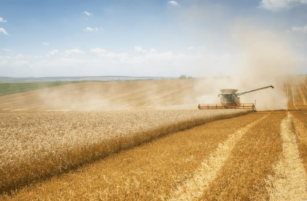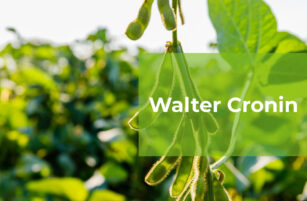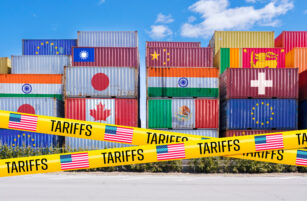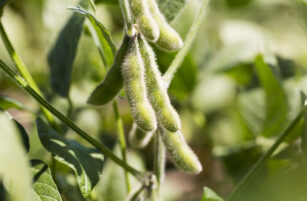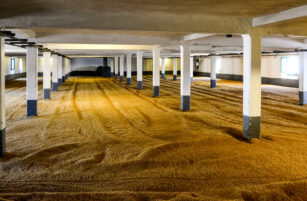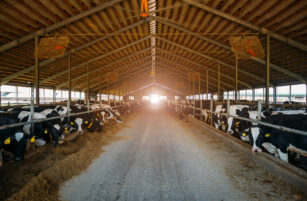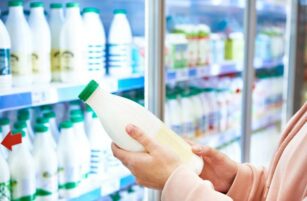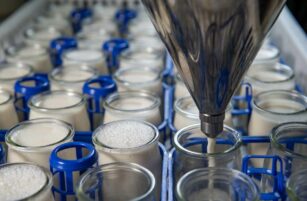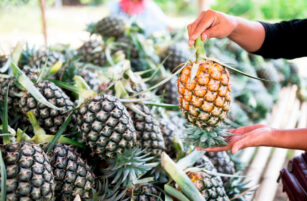Insight Focus
- Infrastructure boosted to help Ukraine export grain.
- Egypt eyes using sweet potatoes in bread.
- Indonesian government looks to boost crude palm oil exports
Disruptions to global transport such as ship congestion in the North Sea and a sharp drop in freight volumes in the Red Sea are impeding European trade, according to the Kiel Institute for the World Economy’s (IfW) Kiel Trade Indicator.
Congestion of container ships in the North Sea continued and was rising, IfW said. It added that over 2% of global cargo capacity is at a standstill there and cannot be loaded or unloaded. The queue is also growing off Shanghai and Zhejiang, with over 4% of global cargo capacity stuck there.

On the Red Sea, the most important trade route between Europe and Asia, there are more than 20% fewer container ships on the move than would be expected under normal circumstances, IfW added.
“In contrast, the situation in North America is improving. The pandemic induced high demand growth for consumer goods has slowed and the congestion off the port of Los Angeles has dissolved. This eases transportation shortages and as a result freight rates from Asia to the North American West Coast have already fallen by almost half since the beginning of the year. Transportation costs on route from Asia to Northern Europe on the contrary remain six times as high as compared to two years ago,“ head of the Kiel Trade Indicator, Vincent Stamer, said.
Further down the supply chain, German retailers fear supply-chain disruption will last until mid-2023, a survey by the Ifo economic research institute showed, Ifo said the situation for food retailers had eased somewhat with the figure saying they were still experiencing procurement problems dropping to around 77% in June from almost 100% in May.
Grain Exports from Ukraine
As far as the global food supply chain goes, one of the biggest challenges is exporting grain from Ukraine without being able to use its Black Sea ports. One alternative route being used is ports on the Danube, and the Russian Interfax news agency quoted Infrastructure Minister Oleksandr Kubrakov as saying during the Ukraine Recovery Conference in Switzerland that Ukraine plans to boost the capacity of its ports on the River Danube by 70% to 25 million tonnes a year.

Romania reopened a Soviet-era, broad-gauge rail link connecting its Danube River port of Galati to Ukraine a month earlier than expected to help boost grain exports, Bloomberg reported. Barges can sail from Galati to the Romanian Black Sea port of Constanta, where, APK-Inform reported, a floating crane is being used to reload crops arriving along the Danube River on barges from Ukraine onto commercial ships for further shipment to third countries.
Disputed Grain Cargoes
Russian-installed authorities in the southeastern Zaporizhzhia region of Ukraine, partly under Russian control, said an agreement had been reached to sell grain abroad, mainly to the Middle East, Reuters reported, quoting Russian state news agency TASS.
The Ukrainian government has accused Russian forces of stealing Ukraine’s grain, something Moscow denies.
Turkey’s ambassador to Ukraine was summoned to the Foreign Ministry after a disputed cargo ship carrying allegedly stolen grain from Ukraine returned from the Turkish port of Karasu to Russian territorial waters, a Turkish source told AFP.
The source said the ship reached Russian territorial waters but had not yet docked in port and still appeared to be carrying the grain.
Kyiv alleges that the 7,000-tonne vessel had set off from Ukraine’s Kremlin-occupied port of Berdyansk after picking up confiscated wheat.
Ukraine has demanded that Turkey impound the vessel and return the allegedly stolen wheat.
But Russia says it has “nationalised” Ukrainian state assets and to be buying crops from local farmers.

Russian-backed separatists have also seized two foreign-flagged ships in the eastern Ukrainian port city of Mariupol, saying they are now “state property”, in the first such moves against commercial shipping, letters seen by Reuters showed.
The situation on Ukraine’s Black Sea coast looks unlikely to change soon. Russia’s ambassador to the UK, Andrei Kelin, told Reuters his country’s forces were unlikely to withdraw from the south of Ukraine any time soon.
France Prioritises Wheat Exports to Egypt
France has made it a priority to ensure that Egypt gets the wheat it needs during the current harvest season, Al-Ahram reported, quoting French Ambassador to Egypt Marc Baréty.

In addition, Egypt is experimenting with using sweet potatoes in bread, amid hopes that the new measure will significantly reduce wheat imports, the Al-Monitor website reported.
To be used in bread, sweet potatoes have to be dried and then ground to a powder. This powder is then added to the wheat flour before mixing. The Ministry of Supply hopes mixing sweet potatoes into bread will reduce wheat imports by a million tonnes a year, almost 10% of annual imports. Informed sources say this is possible, especially if local consumers like the taste of the new bread.
There could also be trouble ahead for another Middle Eastern staple, hummus. Global supplies of chickpeas, the main ingredient, could dip as much as 20% this year, Reuters reported, citing data from the Global Pulse Confederation. Adverse weather in the US and the war in Ukraine have cut supplies, it added.
Indonesia Ramps up Palm Oil Exports
The Indonesian government will promote crude palm oil (CPO) exports to boost the price of palm oil fresh fruit bunches received by farmers, the official Antara news agency reported.
Trade Minister Zulkifli Hasan noted that the policy to ban CPO exports some time back had caused the domestic crude palm oil stock to rise that had led to the price of FFB plunging.
As a result, CPO exports had to be bolstered, so that companies can optimize the absorption of farmers’ palm stocks.
India’s palm oil imports in July are set to jump to the highest in 10 months because of a hefty correction in prices and as Indonesia allows more exports of the tropical oil, four dealers told Reuters.
Another area where supply appears to be easing is fertiliser. Reuters reported, citing data from consultancy Agrinvest Commodities, that Brazil imported record volumes of potassium chloride from Canada in the first half of the year, a sign that domestic farmers will have plenty of the fertilizer to nourish crops, boost yields and potentially expand area when sowing starts in September. Brazil imported 2.291 million tonnes of Canadian potassium chloride between January and June, a 71.2% year-on-year rise.
European Consumers Tighten Belts
In the UK, consumers are reining in the amount of food they buy, according to a survey by the government’s Office for National Statstics. Covering 22 June to 3 July, the survey showed 91% of adults continued to report their cost of living had risen over the past month; an increase from the 62% when the question was first asked 3-14 November 2021. In the latest survey 49% of adults reported that they were buying less food when food shopping and 48% of adults reported they had to spend more than usual to get what they normally buy. These proportions are higher than when the data were first collected (8% and 18% in September and October 2021, respectively).

In Germany, discount supermarket Aldi has cut its meat prices, the Frankfurter Allgemeine Zeitung (in German) reported. The FAZ said this was because of the high price of meat leading to weaker-than-usual demand during the barbecue season and overcapacity in the German meat industry. The newspaper added that other German supermarket chains such as Edeka and Netto intended to follow Aldi’s lead.


